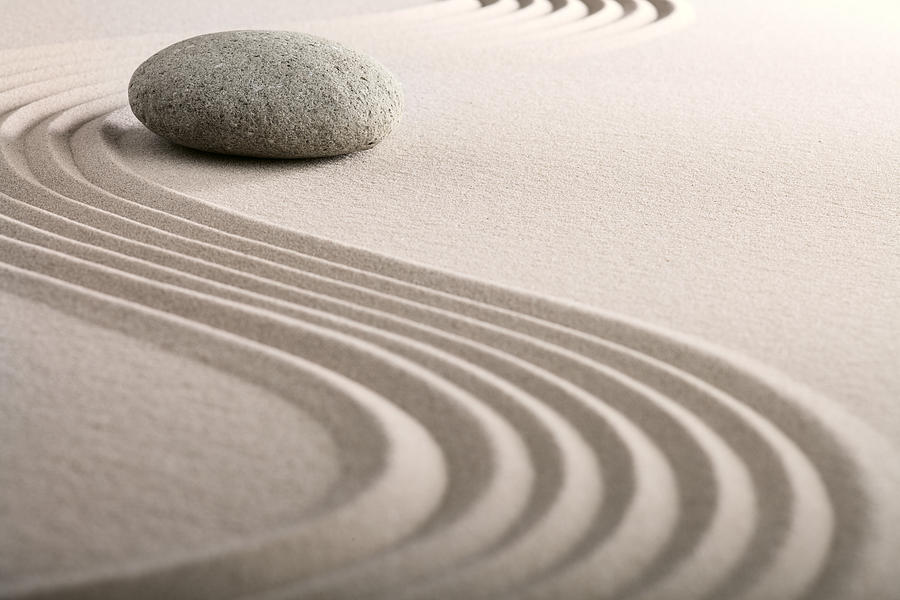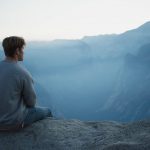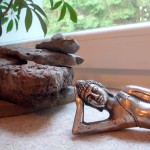
Leo Babauta was a regular kinda guy, doing regular guy stuff. That was until he found a quiet, internal power he never knew he had. Zazen. Simply translated to mean ‘seated meditation’, Zazen is much more. It can create a mindfulness lifestyle.
 Leo’s original intention was to quit smoking. But Zazen lead to a complete lifestyle change, where he now finds great happiness and personal achievement living in simplicity and mindfulness. Since 2005, he has stripped the gloss and glitter from his life. He moved his family from Guam to San Francisco with nothing more than a few personal items, some art and clothing, replaced his car with bicycling, walking and public transportation – and with each simplification he found more peace, more happiness and more personal power.
Leo’s original intention was to quit smoking. But Zazen lead to a complete lifestyle change, where he now finds great happiness and personal achievement living in simplicity and mindfulness. Since 2005, he has stripped the gloss and glitter from his life. He moved his family from Guam to San Francisco with nothing more than a few personal items, some art and clothing, replaced his car with bicycling, walking and public transportation – and with each simplification he found more peace, more happiness and more personal power.
Zen is the tradition of Buddhism that teaches meditation as a means to awakening, awakening into a place of letting go and being present, mindful. It is not a way to escape or ignore conditions around us but instead to release our self-attachment to them. In so doing, we find the inner strength to transform.
Here Leo gives us 12 rules for a mindfulness lifestyle. Enjoy, and get happy in an uncluttered life!
1. Do one thing at a time. This rule (and some of the others that follow) will be familiar to long-time Zen Habits readers. It’s part of my philosophy, and it’s also a part of the life of a Zen monk: single-task, don’t multi-task. When you’re pouring water, just pour water. When you’re eating, just eat. When you’re bathing, just bathe. Don’t try to knock off a few tasks while eating or bathing. Zen proverb: “When walking, walk. When eating, eat.”
2. Do it slowly and deliberately. You can do one task at a time, but also rush that task. Instead, take your time, and move slowly. Make your actions deliberate, not rushed and random. It takes practice, but it helps you focus on the task.
3. Do it completely. Put your mind completely on the task. Don’t move on to the next task until you’re finished. If, for some reason, you have no choice but to move on to something else, try to at least put away the unfinished task and clean up after yourself. If you prepare a sandwich, don’t start eating it until you’ve put away the stuff you used to prepare it, wiped down the counter, and washed the dishes used for preparation. Then you’re done with that task, and can focus more completely on the next task.
4. Do less. A Zen monk doesn’t lead a lazy life: he wakes early and has a day filled with work. However, he doesn’t have an unending task list either — there are certain things he’s going to do today, an no more. If you do less, you can do those things more slowly, more completely and with more concentration. If you fill your day with tasks, you will be rushing from one thing to the next without stopping to think about what you do.
5. Put space between things. Related to the “Do less” rule, but it’s a way of managing your schedule so that you always have time to complete each task. Don’t schedule things close together — instead, leave room between things on your schedule. That gives you a more relaxed schedule, and leaves space in case one task takes longer than you planned.
6. Develop rituals. Zen monks have rituals for many things they do, from eating to cleaning to meditation. Ritual gives something a sense of importance — if it’s important enough to have a ritual, it’s important enough to be given your entire attention, and to be done slowly and correctly. You don’t have to learn the Zen monk rituals — you can create your own, for the preparation of food, for eating, for cleaning, for what you do before you start your work, for what you do when you wake up and before you go to bed, for what you do just before exercise. Anything you want, really.
7. Designate time for certain things. There are certain times in the day of a Zen monk designated for certain activities. A time for for bathing, a time for work, a time for cleaning, a time for eating. This ensures that those things get done regularly. You can designate time for your own activities, whether that be work or cleaning or exercise or quiet contemplation. If it’s important enough to do regularly, consider designating a time for it.
8. Devote time to sitting. In the life of a Zen monk, sitting meditation (zazen) is one of the most important parts of his day. Each day, there is time designated just for sitting. This meditation is really practice for learning to be present. You can devote time for sitting meditation, or do what I do: I use running as a way to practice being in the moment. You could use any activity in the same way, as long as you do it regularly and practice being present.
9. Smile and serve others. Zen monks spend part of their day in service to others, whether that be other monks in the monastery or people on the outside world. It teaches them humility, and ensures that their lives are not just selfish, but devoted to others. If you’re a parent, it’s likely you already spend at least some time in service to others in your household, and non-parents may already do this too. Similarly, smiling and being kind to others can be a great way to improve the lives of those around you. Also consider volunteering for charity work.
10. Make cleaning and cooking become meditation. Aside from the zazen mentioned above, cooking and cleaning are to of the most exalted parts of a Zen monk’s day. They are both great ways to practice mindfulness, and can be great rituals performed each day. If cooking and cleaning seem like boring chores to you, try doing them as a form of meditation. Put your entire mind into those tasks, concentrate, and do them slowly and completely. It could change your entire day (as well as leave you with a cleaner house).
11. Think about what is necessary. There is little in a Zen monk’s life that isn’t necessary. He doesn’t have a closet full of shoes, or the latest in trendy clothes. He doesn’t have a refrigerator and cabinets full of junk food. He doesn’t have the latest gadgets, cars, televisions, or iPod. He has basic clothing, basic shelter, basic utensils, basic tools, and the most basic food (they eat simple, vegetarian meals consisting usually of rice, miso soup, vegetables, and pickled vegetables). Now, I’m not saying you should live exactly like a Zen monk — I certainly don’t. But it does serve as a reminder that there is much in our lives that aren’t necessary, and it can be useful to give some thought about what we really need, and whether it is important to have all the stuff we have that’s not necessary.
12. Live simply. The corollary of Rule 11 is that if something isn’t necessary, you can probably live without it. And so to live simply is to rid your life of as many of the unnecessary and unessential things as you can, to make room for the essential. Now, what is essential will be different to each person. For me, my family, my writing, my running and my reading are essential. To others, yoga and spending time with close friends might be essential. For others it will be nursing and volunteering and going to church and collecting comic books. There is no law saying what should be essential for you — but you should consider what is most important to your life, and make room for that by eliminating the other less essential things in your life.
Leo has written a book, The Power of Less: The Fine Art of Limiting Yourself to the Essential, in Business and in Life and he also has several ebooks available on his blog here.



This article is aligned closely with my own beliefs and intentions. My morning ritual is a cup of tea, and that is my first ‘meditation’ of the day. I appreciate that I have easy access to water, heat, and feel the tea nourishing my body.my second ‘meditation’ is the shower – a cleansing ritual, again giving thanks for what I am privileged to have access to.
Of course, this is not meditation in its purist form, but nurtures an attitude of mindfulness and appreciation within me. Thank you for this article – it is well-written and an excellent reminder for me.
WonderfuL article. Thank you. I am beginning to install some of these habits and this has been a very useful guide.
Very useful